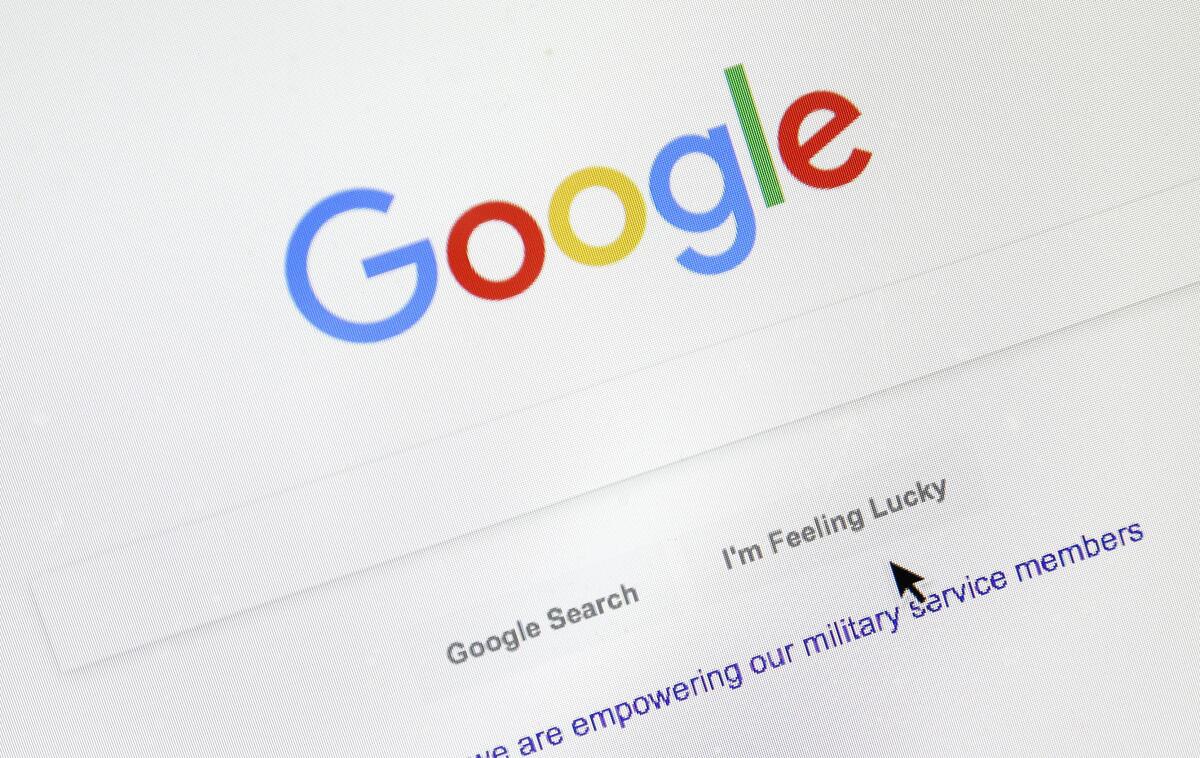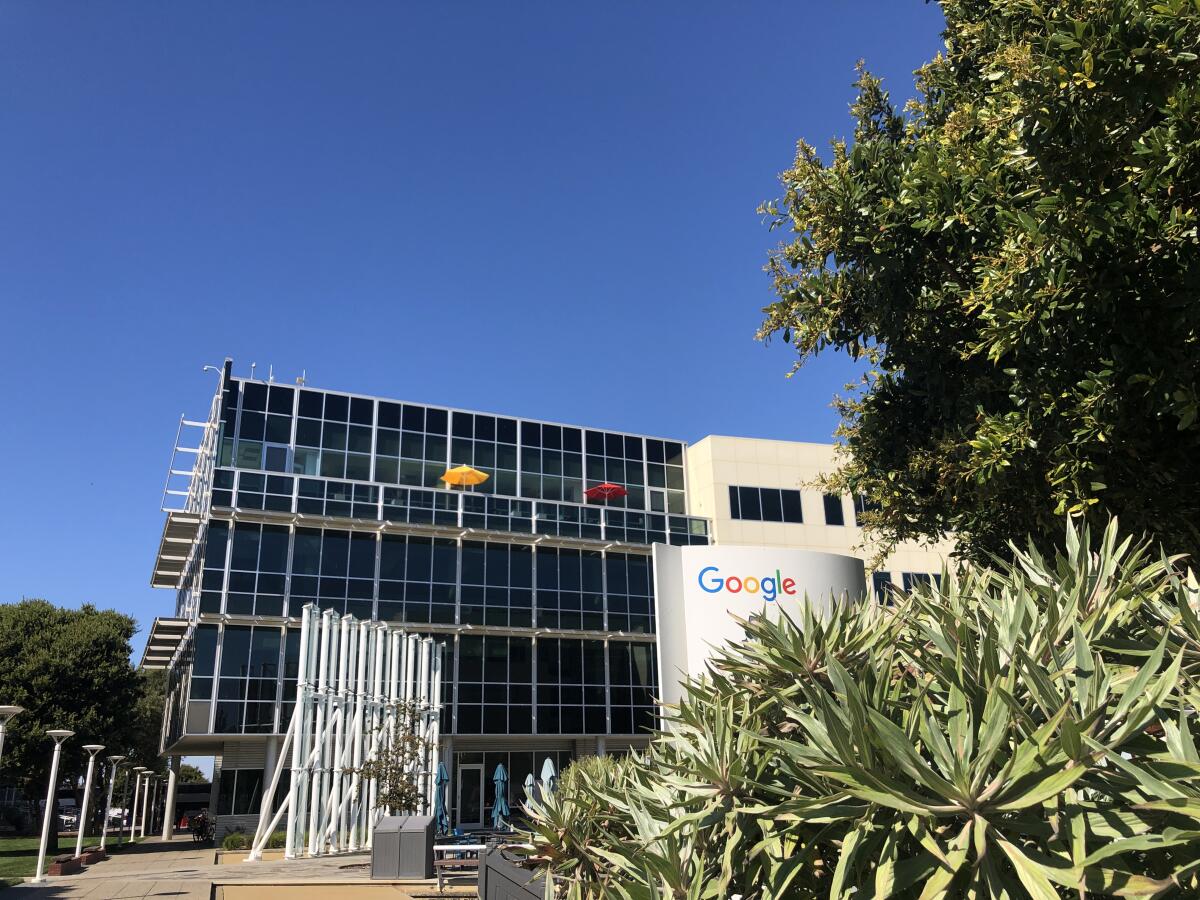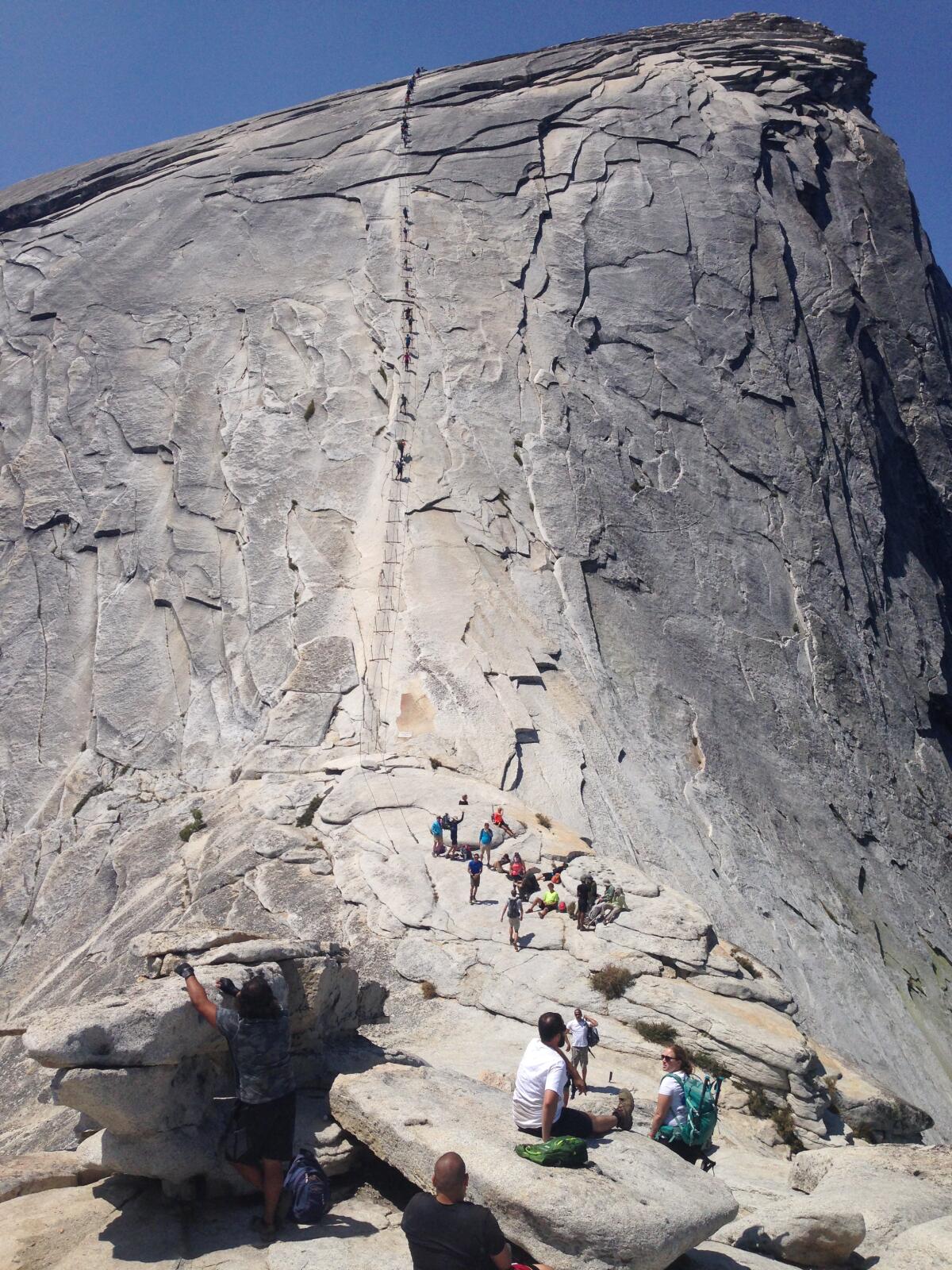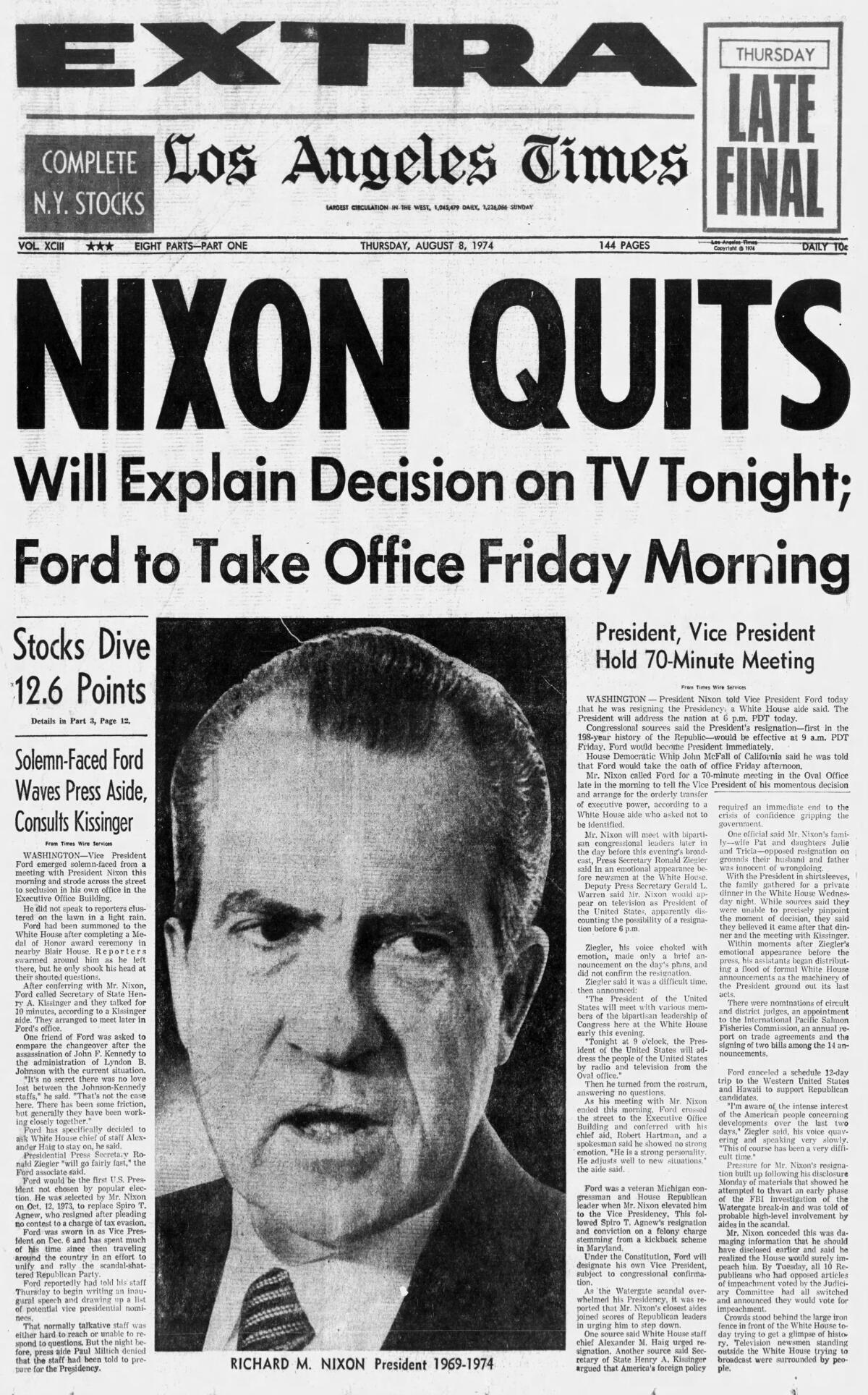What to know about Google’s ‘watershed’ antitrust loss

- Share via
Good morning. It’s Thursday, Aug. 8. Here’s what you need to know to start your day.
- Google’s web search dominance faces scrutiny in court.
- Why many LGBTQ+ people hope for a Harris win.
- In an area packed with live music arenas, can Inglewood’s Intuit Dome still make a splash?
- And here’s today’s e-newspaper
You're reading the Essential California newsletter
Our reporters guide you through our biggest news, features and recommendations every morning
You may occasionally receive promotional content from the Los Angeles Times.
“Google is a monopolist, and it has acted as one to maintain its monopoly.”
So ruled U.S. District Judge Amit Mehta in a landmark antitrust decision against the Mountain View-based tech titan.
Regulators argued Google maintained its web search dominance by paying billions to browser developers, phone manufacturers and wireless carriers in exchange for pre-loading Google as their products’ default search engine. When was the last time you looked something up not via Google search?
“The much-anticipated decision marks a significant victory for federal regulators trying to rein in the power of Big Tech and could send shock waves through the tech world,” my colleague Samantha Masunaga reported this week. “Other firms, including Apple, Meta and Amazon, also face federal antitrust lawsuits.”
Attorneys general in several states, including California, joined the federal lawsuit against Google, first filed in October 2020.
“As the fifth largest economy in the world, California has a special interest in protecting a landscape where competition and innovation will flourish,” state Atty. Gen. Rob Bonta wrote in a statement. “This historic win sets the tone for what we as a country and state will not allow.”
A case that ‘puts the world on notice’

The outcome marks a “watershed moment,” said Randy Stutz, president of the American Antitrust Institute, which advocates for strong enforcement of antitrust laws.
“You don’t often see cases against firms in the top 10 in market cap go to trial and get a verdict like this,” he said. “This really puts the world on notice that these cases need to be taken seriously and that these enforcers have some strong arguments — winning arguments — to back up their claims.”
Stutz noted that the ruling doesn’t fault Google for building a superior search engine that paved the way for its web browser dominance.
Rather, the case focused on Google’s “monopoly maintenance,” he explained, or “what it’s done since then to preserve its dominance and prevent competition from emerging.”
The last monopolization case of this magnitude was the antitrust lawsuit brought against Microsoft nearly 25 years ago, according to Stutz, which faulted that company’s tactics to maintain its dominance in personal computer software.
What does this mean for Google?
For the moment, nothing. Judge Mehta’s decision was one phase of the proceedings, but there’s still a remedy phase, which will outline steps for Google to take in order to loosen its monopolizing grip in the eyes of the law.
It’s unclear exactly what those steps would be.
The company meanwhile plans to appeal the ruling.
“This decision recognizes that Google offers the best search engine, but concludes that we shouldn’t be allowed to make it easily available,” Kent Walker, president of Google Global Affairs, said in a statement. “As this process continues, we will remain focused on making products that people find helpful and easy to use.”
Those upcoming proceedings could take awhile, Stutz said, which highlights one “real drawback” of antitrust laws: Cases move slowly, while technology moves fast.
What could this mean for internet consumers?
In theory, it could mean fewer web browsers and mobile devices come with Google as the default web search option, opening the door to competition. Remember Bing? How about Yahoo?
Because right now, Google search’s market share is nearly a full pie, Samantha noted in her reporting:
“In 2009, 80% of U.S. web searches went through Google. By 2020, that figure was nearly 90%, according to the ruling. Almost 95% of mobile searches used Google.”
Stutz said the ruling opens the door for other companies to compete with Google and bring innovation to “what’s become a very stagnant market.” That, ideally, gives consumers more options and better experiences.
“It’s incredibly important right now that we create room for competition and room for the best and the most innovative products to reach customers [and] advertisers and have a chance,” he said.
The search engine market is already in the midst of a potential shakeup. Established companies like Google and OpenAI, along with startups, are integrating AI or launching AI-powered search engines, though some have had a rough start.
More antitrust cases are pending
This isn’t the only antitrust case Google is facing.
Early last year the U.S. Department of Justice — joined by California and several other states — sued the company, alleging it has an illegal stranglehold on online advertising.
And Google is not alone. A litany of antitrust cases have been brought against Amazon, Apple and Meta.
Bonta sued Amazon in 2022, accusing the online retail juggernaut of inflating prices and thwarting competition from other e-commerce sites. The Federal Trade Commission and 17 other states filed their own lawsuit in 2023, alleging much of the same.
California also joined the U.S. Justice Department and 15 other states this March in a lawsuit against Apple. The lawsuit alleges Apple worked to monopolize the smartphone market “by imposing a series of shapeshifting rules and restrictions in its App Store guidelines and developer agreements that would allow Apple to extract higher fees, thwart innovation, offer a less secure or degraded user experience, and throttle competitive alternatives.”
But given the slow pace of antitrust proceedings, we’ll be several years older when most of those cases are resolved.
Today’s top stories

The Kamala Harris ticket
- ‘Our lives are on the line’: Why many LGBTQ+ people hope for a Harris win.
- Harris has ushered in a new ‘F’ word for Democrats: Fun.
- Why Steve Martin declined Lorne Michaels’ offer to play Tim Walz on ‘SNL.’
California politics
- As Democrats work to make California a haven for abortion access, some cities are pushing back.
- LAUSD is poised to put $9-billion bond measure, its largest, before voters in November.
- ‘Bubble zones’ are proposed to keep back protesters at abortion clinics and synagogues in L.A.
- GOP Rep. Mike Garcia, in tough reelection bid, says job is to keep U.S. from becoming California.
Climate & environment
- Wildfire ignites northeast of Placerville, forcing evacuations in El Dorado County.
- Forest Service orders Arrowhead bottled water company to shut down California pipeline.
- You aren’t cursed (probably). Spiders really are more active in L.A. right now.
- First giant pandas in decades unveiled at San Diego Zoo. Newsom declares California Panda Day.
Courts & crime
- Behind a Monterey Park girl’s mysterious disappearance: A father and mother at war.
- California Department of Justice kills controversial sheriff’s corruption inquiry into Sheila Kuehl.
- Tom Girardi’s fraud trial began Tuesday. Is he a liar who stole millions? Or the victim of a thieving CFO?
- Watchdog group seeks investigation into Inland Empire Congressman Ken Calvert.
- Father and son found guilty in murder of rapper PnB Rock, who was gunned down at Roscoe’s Chicken & Waffles.
- Mitrice Richardson vanished 15 years ago in Malibu. L.A. County has a new reward in her case.
Business
- Disney’s streaming business turns a profit. But parks show signs of trouble.
- Longtime businesses in L.A. can apply for city-funded grants of up to $20,000.
- The RIAA, villain of the Napster era, turns its sights on AI firms.
- In deal with union, Hotel Figueroa in downtown L.A. to hire back some restaurant workers.
Science & medicine
- Historically Black medical school in South L.A. receives largest gift ever.
- Patients phoning for Medi-Cal help hit with hourlong waits, disconnections, audit finds.
- Boeing sent two astronauts into space. Now NASA says it may need SpaceX to go get them.
Intuit Dome
- In an area packed with live music arenas, can Inglewood’s Intuit Dome still make a splash?
- L.A.’s new Intuit Dome just might be one of the best arena designs in America. But there’s one missing link.
- Sebastian Maniscalco never dreamt he’d play arenas. Now he’s christening L.A.’s newest one.
- 8 upcoming shows we’re most excited for at Intuit Dome.
- Intuit Dome, along with SoFi Stadium, will be added to the L.A. 2028 Summer Olympics revamped venue plan.
More big stories
- With family budgets already squeezed, back-to-school costs sting more.
- Zelle scams prompt federal probe into whether banks are doing enough to protect customers.
- Many immigrant spouses without legal status left out of Biden’s plan despite deep U.S. ties.
- Real estate commission rules are about to change. Here’s how it could affect home buying.
- Urban and rural teens swapped hometowns and were shocked by what they learned about each other.
- A weird, whimsical game is hiding in the bookshelves at Los Angeles Public Library.
- U.S. earned redemption, won first medal in artistic swimming in 20 years.
Get unlimited access to the Los Angeles Times. Subscribe here.
Commentary and opinions
- Anita Chabria: ‘Tampon Tim’ is a litmus test for American men.
- Gustavo Arellano: Can Antonio Villaraigosa charm his way into becoming California governor?
- Editorial: Newsom and San Francisco take a wrong turn on homelessness.
Today’s powerful reads

After a young woman falls to her death in Yosemite, Half Dome’s risks on everyone’s mind. Jonathan Rohloff is still reeling from the horror of watching his 20-year-old daughter slide to her death off Yosemite’s Half Dome. He said his request for more safeguards on the century-old climbing cables that lead to the summit has met with “deafening” silence from park officials.
Other great reads
- As breaking debuts at Olympics, meet the New York DJ behind the Paris party.
- How two strangers found each other and solved the mystery of an L.A. watchmaker.
- A Long Beach sunset cruise turned into a deadly nightmare. It could have been even worse.
- A childhood memory sent her father to prison for murder. Was it real?
How can we make this newsletter more useful? Send comments to essentialcalifornia@latimes.com.
For your downtime
Going out
- 🍤 18 of the best seafood tacos in L.A. from the 101 tacos guide.
- 🥤Grab a smoothie, draw some blood. Inside L.A.’s new $50,000-a-year wellness club.
Staying in
- 🧑🍳 Here’s a recipe for spicy watermelon and tahini salad with pistachios and mint.
- ✏️ Get our free daily crossword puzzle, sudoku, word search and arcade games.
And finally ... from our archives

Confronted by the almost absolute possibility of impeachment for his role in the Watergate scandal, President Richard M. Nixon in a television speech announced his resignation on this day in 1974. He was succeeded by Gerald Ford the following day.
“I have never been a quitter. To leave office before my term is completed is opposed to every instinct in my body,” Nixon told the American people. “But as President I must put the interests of America first.”
Have a great day, from the Essential California team
Ryan Fonseca, reporter
Defne Karabatur, fellow
Christian Orozco, assistant editor
Stephanie Chavez, deputy metro editor
Karim Doumar, head of newsletters
Check our top stories, topics and the latest articles on latimes.com.
Sign up for Essential California
The most important California stories and recommendations in your inbox every morning.
You may occasionally receive promotional content from the Los Angeles Times.








